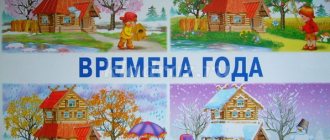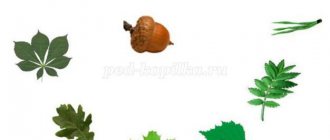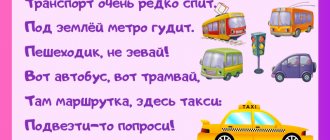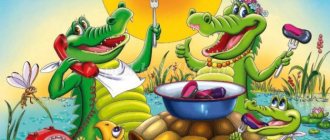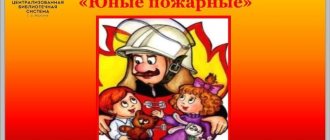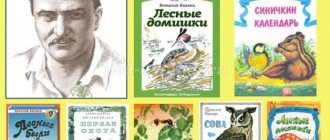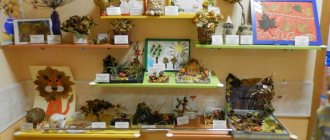Game - quiz with a presentation on the theme “Autumn” for primary schoolchildren, grades 2-3
Summary of the quiz game “Hello, Autumn!”
Description of the material: the quiz script can be used to organize class hours and extracurricular activities. The development will be useful for school teachers, additional education teachers, teacher organizers, and children's camp counselors. Participants: students in grades 2-3. Goal: to generalize and expand children’s knowledge about the season - Autumn. Objectives: • consolidate and develop the skills of collective communication and activity of children; • consolidate knowledge about the phenomena of living and inanimate nature in the autumn season; • create conditions for creative self-expression; • activate mental processes: memory, attention, perception, speech, imagination. Equipment: multimedia presentation, projector and screen, sound speakers, sheets for writing down answers, Whatman paper, dried leaves, PVA glue, scissors, colored paper, pencils, pens, signal cards (green and red).
Progress of the game:
The class is divided into 2 teams and answer the proposed questions.
All questions are presented in the presentation and are divided into blocks: “Feathered Friends”, “Writer’s Autumn”, “Autumn Holidays”, “What’s Extra”, “Autumn Notes”, “Autumn Draws”. Block "Feathered Friends". There are images of birds on the screen. The task of the teams is to remember their names and determine which category they belong to: “wintering” or “migratory”. Score: for each correctly distributed bird - 1 point. The maximum score is 8. Children enter their answers into a table. Answers: Wintering birds - sparrow, pigeon, tit, bullfinch. Migratory birds - cuckoo, crane, mallard, swift. If the children have difficulty determining the category for the bullfinch, then the presenter explains: The bullfinch is a wintering bird. We constantly see bullfinches only in winter because in summer they live in forests where there is plenty of food. But in winter, when everything is covered with snow, there is no food in the forest. And bullfinches begin to fly long distances from forests in search of food. In summer, bullfinches live only in forests that are located far from populated areas with people. Bullfinches build nests and hatch chicks in the summer. And for this they need peace and quiet. So they hide in the forests. They especially like to build nests at the very tops of spruce trees, such as spruce or pine. The tops of these trees are high and it is difficult for people to see bullfinches there. Block “Writer's Autumn”. The slides contain excerpts from poems and stories. Teams need to determine the author and/or from which work. The answers are written on separate pieces of paper and submitted for verification. Score: for each correct answer - 2 points, maximum - 6. 1. Ice pieces crunch under your feet, You can’t see anything. Darkness. And the invisible leaves rustle, flying around from every bush... (Evgenia Fedorovna Trutneva) 2. Kwa! - said the frog and immediately turned around to see if there were any friends here who could hear her and judge her for croaking in the fall. She really couldn’t resist croaking at least once. - Take me with you! - This is amazing to me! - exclaimed the duck. - How will we take you? You don't have wings. (Vsevolod Mikhailovich Garshin “The Frog Traveler”) Already the sky was breathing in autumn, The sun was shining less often, The day was getting shorter, The mysterious forest canopy was exposed with a sad noise, Fog was laying down on the fields, A caravan of noisy geese was stretching to the south: a rather boring time was approaching; It was already November outside the yard. (Alexander Sergeevich Pushkin) Physical exercise : Children stand up and repeat the words and movements after the leader. Suddenly the clouds covered the sky (We rise on our toes, raise our crossed arms up), the prickly rain began to drip (Jumping on our toes, hands on our belts). The rain will cry for a long time, It will spread slush everywhere (We squat, hands on our belts.) Mud and puddles on the road, Raise your legs higher (We walk in a circle with a high knee lift). Block “Autumn Holidays”: On the slides the names of the holidays, you must write the date. The answers are written on separate pieces of paper and submitted for verification. Score: 1 point for each correct answer, maximum 4 points. Answers:
September 1 – Day of Knowledge; October 5 – International Teachers Day; November 4 – National Unity Day; November 18 – Father Frost’s birthday;
Block "What's extra":
There are pictures on the slides, teams must choose the odd one out and explain why.
Teams raise signal cards and give an answer. Score: 2 points for the correct answer (or 1 if the choice is correct but the explanation is not). Maximum – 6. 1. Apple tree, plum tree, pear tree, birch tree (answer: birch, because the rest of the trees have fruit); 2. Maple leaf, poplar leaf, birch leaf (maple leaf, because in the fall it not only turns yellow, but also turns red). 3. Hare, squirrel, fox, weasel (fox, because it does not change the color of its coat depending on the season). Children can name the squirrel because... it lives in tree hollows, however, weasels can also live in low-lying hollows. Block “Autumn Notes”: Teams listen to backing tracks of songs with an autumn theme, hold up signal cards and give an answer. Answers: 1. “Forest Deer”; 2. “Autumn has knocked on our door”; 3. “Natasha the first-grader.” The block “draws Autumn”. The team creates a collage of autumn leaves. Equipment: Whatman paper A3, dried leaves, colored paper, scissors, PVA glue. 5 points for the collage. Summing up:
Well done to everyone. (Count points) Team __________ won.
Presentation on the topic: Quiz game “Hello, Autumn!”
We recommend watching:
Autumn holiday in 1st grade. Script Quiz with answers on the topic Autumn for primary school Autumn ball in primary school. Script Quiz on the topic: Autumn with answers for grades 1-2
Similar articles:
Autumn holiday in elementary school. Mushrooms
Autumn Festival for high school students. Script and competitions
Autumn Festival in elementary school. Script, 1st grade
Class hour “Late Autumn”, 2nd grade
Autumn Festival in elementary school. Scenario with competitions
Competitive presentation-quiz “Big letters” on the theme of autumn
Quiz “CAPITAL LETTERS” on the theme “Autumn” Purpose: to generalize and expand children’s knowledge about the season - Autumn. Objectives: 1) consolidate children’s knowledge about the characteristic signs of autumn, patterns in nature; 2) broaden students’ horizons, develop logic, imagination, and the ability to work in a team; 3) instill a love of nature. Equipment: multimedia presentation, cards with tasks for students, tokens. Progress of the event: It's a sad time! Ouch charm! Your farewell beauty is pleasant to me - I love the lush decay of nature, Forests dressed in crimson and gold... A.S. Pushkin Presenter: Hello guys! Usually autumn - the time of withering of nature - causes a feeling of sadness and melancholy. But if warm and dry weather sets in for some time, and the forest is dressed in bright golden colors, then the very beauty of autumn nature evokes a feeling of vivacity, a cheerful mood. Autumn is one of the wonderful times of the year. Today we will conduct a quiz, these are competitions where you will show your knowledge about autumn, ingenuity and ingenuity. For the correct answer, each team will receive tokens. Let's start with warming up the mind. Warm-up “Say a word” (answers in chorus) 1) Wash the roof of the hut. He will take Misha to the den, complete the peasant’s work, and then rustle the leaves. We will quietly ask her: “Who are you?” - And will we hear? ...(autumn) 2) What’s that squeak? What's that crunch? What kind of bush is this? How can I be without crunch, If I... (cabbage) 3) Both green and thick A bush grew in the garden bed. Dig a little: Under the bush... (potatoes). 4) Near the forest on the edge, Decorating the dark forest, It grew motley, like parsley, Poisonous... (fly agaric). 5) Round side, yellow side, Kolobok sits on the bed. Rooted firmly into the ground. What is this? (turnip) 6) I met an old grandfather. The grandfather was not yet gray at all, He stood among the leaves and grass - Wearing a hat, but without a head. (mushroom) 7) It is round and red, Like the eye of a traffic light, Among vegetables there is no Juicier... (tomato) The Golden Sun grew from a seed. (sunflower) 9) A brave army was walking along the garden bed along the fence. Hundreds of hands hold the peaks, The bitter one grows... (onion) 10) We saw him dressed in spring and summer. And in the fall, all the shirts were torn off the poor thing. (tree) 11) Red Egorka fell into the lake. He himself did not drown and did not stir up the water. (leaf) 12) What kind of tree stands? There is no wind - it trembles. (aspen) 13) A relative has a Christmas tree with very soft needles. But unlike the Christmas tree, those needles fall. (larch)
The Golden Sun grew from a seed. (sunflower) 9) A brave army was walking along the garden bed along the fence. Hundreds of hands hold the peaks, The bitter one grows... (onion) 10) We saw him dressed in spring and summer. And in the fall, all the shirts were torn off the poor thing. (tree) 11) Red Egorka fell into the lake. He himself did not drown and did not stir up the water. (leaf) 12) What kind of tree stands? There is no wind - it trembles. (aspen) 13) A relative has a Christmas tree with very soft needles. But unlike the Christmas tree, those needles fall. (larch) Host: What autumn months do you know? Guess what month we'll be talking about? The collective farm garden is empty, Cobwebs are flying into the distance, And cranes have flocked to the southern edge of the earth. School doors opened. What month has it come to us? September – spring (heather blooms), deciduous season. Signs • In September the forest is thinner and the birds' voices are quieter. • In September (October) there is one berry, and that one is bitter rowan. • September is cold, father, but there is plenty to feed. - And now what month will you hear about? The face of nature is becoming increasingly gloomy: The vegetable gardens have turned black, the forests are becoming bare, the bird voices are falling silent, the bear has fallen into hibernation. What month did he come to us? October – mud Signs • October is crowned with white snow and great mud. • September smells like apples, October smells like cabbage. • October thunder – for a snowless winter. And finally, the last month of autumn. The field became black and white: rain and snow are falling. And it got colder - the waters of the rivers were frozen in ice. The winter rye is freezing in the field. What month is it, tell me! November - semi-winter, off-road. Signs • The forge is small in November, but it forges fetters on all rivers. • Father, October is cold, and November has made it too cold. • The last month of autumn is November, the gate of winter. There are many autumn signs and now we will check how well you know them. To do this you need to answer questions. 1 competition: “What autumn has in store for us” Question 1. It is believed that real snow, no matter how much it falls, will not fall for a long time until: a) The storks fly away b) The mushrooms run out c) The potatoes are dug up d) The cherries are gone the leaves will fly off. Answer: Until the leaves fall from the cherries, no matter how much snow falls, the thaw will drive it away. Question 2. According to the superstition, you can predict the time of spring in the fall. It depends on which side: a) The birch trees turn yellow b) The wind blows during the first snowfall c) The puddles freeze after the first cold weather d) The cranberries ripen faster Answer: If in the fall the birch trees turn yellow from the top, next spring will be early, but if from below, it's late. Question 3. November 19 - on Paul the Confessor they watched the rivers - if ice mountains form on the river, then we should also expect “mountains”: a) Dirt b) Bread c) Snow d) Money Answer: Next year should be fruitful: there will be “mountains” of bread. Question 4: There will be a snowless and short winter if in October: a) Thunder strikes b) Crayfish whistles c) Poplar blossoms d) No stars will be visible Answer: Thunder will thunder and the winter will be mild Question 5. Only in November will there be the first frosts, if on Irina's day - October 1st it is still: a) The snow has not fallen b) The raspberries have not departed c) The cranes have not flown away d) The bears have not gone to bed Answer: October 1st - also called “Arina - the crane year”. If the cranes go south, it means that real frosts will begin soon. Question 6. Sometimes peasants predicted what the winter would be like by the thickness of: a) Crow's nests b) The skins of an onion c) The fat fed by bears d) The last annual ring of a tree Answer: Before the harsh winter, the onion grew proper “clothes” for itself. Host: Great, consider that you have warmed up before the next, very difficult competition, in which you will have to work hard. Our ancestors had very categorical opinions regarding lazy people and idleness, which were expressed in numerous proverbs about work.
Competition 2: “The day until the evening is boring if there is nothing to do.” Your task is to restore the confused parts of proverbs. For each correct proverb you get one token. Proverbs for the first team: To eat a fish and dig mountains. Lying in one place, God willing. The ant is not big, you have to get into the water. A lazy spinner even grows moss on a stone. Those who get up early and don’t have a shirt for themselves. I ended up not even getting the fish out of the pond. Lazy people know the holidays, go for a walk with confidence. Working with teeth and laziness spoils it. A person’s work feeds him but he doesn’t remember everyday life. Without labor, but laziness with the tongue. Answers: • To eat a fish you have to get into the water. • Lying in one place, the stone becomes overgrown with moss. • The ant is not big but digs mountains. • The lazy spinner doesn’t even have a shirt for herself. • God bless those who get up early. • Finished the job and go for a walk. • A lazy person knows holidays but doesn’t remember everyday life. • Work with teeth and laziness with tongue. • Labor feeds a person, but laziness spoils him. • You can’t even pull a fish out of a pond without difficulty. Proverbs for the second team: Whoever plows is not lazy when you sleep until lunch. Don’t rush to put your tongue on both of them – it’ll be easier to cope with. From righteous labors bread will be born to him. Don't blame your neighbor and hurry up. It's hard work half a shoulder to make stone chambers. In the lazy man's yard someone else's tree sticks out with an edge. There will be no boredom lying on the stove. A dejected cow and no bread in sight. Labor money lies tightly on the table. Don't sit idly by, there's a lot of milk. Answers: • He who is not lazy to plow will produce bread. • Don't rush with your tongue and hurry with your deeds. • From the labors of the righteous one cannot make stone chambers. • Don't blame your neighbor when you sleep until lunchtime. • The work is hard when you put both of you together and it’s easier to handle it. • The lazy one has it in his yard and on his table. • Lying on the stove and not seeing any bread. • A dejected cow carries a lot of milk. • Labor money lies tightly, someone else’s money sticks out like an edge. • Don't sit idle and you won't get bored.
Presenter: What strong teams we have today, they again coped with the task. The time has come for the captains to demonstrate their intellectual abilities. The next competition will show which of them is the smartest. For each correct answer, the team receives a token. Competition 3: “The Smartest” Questions for team 1: 1. This is the month of heavy rains, colorful leaves, farewell bird songs. He asks autumn to visit. What is the name of this month? (September) 2. Name the “mustachioed” vegetables? (Peas) 3. Which forest dweller dries mushrooms on his trees? (Squirrel.) 4. Which vegetables have a “red nose”? (Radishes, beets, tomatoes) 5. Which trees have green leaves? (Alder.) 6. Who has cheeks like bags? (Hamster.) 7. Wooden abode of sauerkraut. (Barrel) 8. Composition of dried flowers. (Herbarium) 9. Bee house. (Beehive) 10. Where does autumn begin? (Starting with an “o”) 11. What do people call the season in September? (Indian Summer) Questions for team 2: 1. A month of autumn off-road conditions, bare cooling earth, freezing rains and sleet. What is it called? (October.) 2. Which vegetable has “eyes”? (Potatoes.) 3. Which animal will still have babies in the fall? (Hare.) 4. Which trees’ leaves turn red in the fall? (Aspen, maple.) 5. Who picks apples with their backs? (Hedgehog) 6. What is the autumn flight of birds called? (Migration) 7. Glass shelter of vegetables. (Jar) 8. Fruits boiled in syrup. (Jam) 9. The result of bee labor. (Honey, wax) 10. How does September, October, November end? (With a soft sign) 4th competition: “In the autumn garden” In the cells of the drawing, the team needs to enter five names of common vegetable plants that end in “A”.
Answers: Turnips, beets, rutabaga, radishes, cabbage. Summarizing. Presenter: Well done, guys! You really know a lot about this wonderful time of year - Autumn. Thanks everyone for your work! See you again!!!
